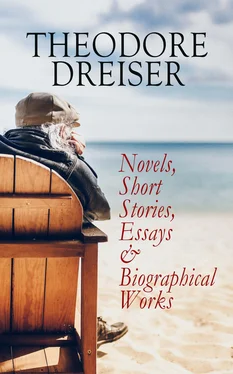“Let go,” said Hurstwood, savagely.
“I’ll show you – you scab!” cried a young Irishman, jumping up on the car and aiming a blow at Hurstwood. The latter ducked and caught it on the shoulder instead of the jaw.
“Away from here,” shouted an officer, hastening to the rescue, and adding, of course, the usual oaths.
Hurstwood recovered himself, pale and trembling. It was becoming serious with him now. People were looking up and jeering at him. One girl was making faces.
He began to waver in his resolution, when a patrol wagon rolled up and more officers dismounted. Now the track was quickly cleared and the release effected.
“Let her go now, quick,” said the officer, and again he was off.
The end came with a real mob, which met the car on its return trip a mile or two from the barns. It was an exceedingly poor-looking neighbourhood. He wanted to run fast through it, but again the track was blocked. He saw men carrying something out to it when he was yet a half-dozen blocks away.
“There they are again!” exclaimed one policeman.
“I’ll give them something this time,” said the second officer, whose patience was becoming worn. Hurstwood suffered a qualm of body as the car rolled up. As before, the crowd began hooting, but now, rather than come near, they threw things. One or two windows were smashed and Hurstwood dodged a stone.
Both policemen ran out toward the crowd, but the latter replied by running toward the car. A woman – a mere girl in appearance – was among these, bearing a rough stick. She was exceedingly wrathful and struck at Hurstwood, who dodged. Thereupon, her companions, duly encouraged, jumped on the car and pulled Hurstwood over. He had hardly time to speak or shout before he fell.
“Let go of me,” he said, falling on his side.
“Ah, you sucker,” he heard some one say. Kicks and blows rained on him. He seemed to be suffocating. Then two men seemed to be dragging him off and he wrestled for freedom.
“Let up,” said a voice, “you’re all right. Stand up.”
He was let loose and recovered himself. Now he recognised two officers. He felt as if he would faint from exhaustion. Something was wet on his chin. He put up his hand and felt, then looked. It was red.
“They cut me,” he said, foolishly, fishing for his handkerchief.
“Now, now,” said one of the officers. “It’s only a scratch.”
His senses became cleared now and he looked around. He was standing in a little store, where they left him for the moment. Outside, he could see, as he stood wiping his chin, the car and the excited crowd. A patrol wagon was there, and another.
He walked over and looked out. It was an ambulance, backing in.
He saw some energetic charging by the police and arrests being made.
“Come on, now, if you want to take your car,” said an officer, opening the door and looking in. He walked out, feeling rather uncertain of himself. He was very cold and frightened.
“Where’s the conductor?” he asked.
“Oh, he’s not here now,” said the policeman.
Hurstwood went toward the car and stepped nervously on. As he did so there was a pistol shot. Something stung his shoulder.
“Who fired that?” he heard an officer exclaim. “By God! who did that?” Both left him, running toward a certain building. He paused a moment and then got down.
“George!” exclaimed Hurstwood, weakly, “this is too much for me.”
He walked nervously to the corner and hurried down a side street.
“Whew!” he said, drawing in his breath.
A half block away, a small girl gazed at him.
“You’d better sneak,” she called.
He walked homeward in a blinding snowstorm, reaching the ferry by dusk. The cabins were filled with comfortable souls, who studied him curiously. His head was still in such a whirl that he felt confused. All the wonder of the twinkling lights of the river in a white storm passed for nothing. He trudged doggedly on until he reached the flat. There he entered and found the room warm. Carrie was gone. A couple of evening papers were lying on the table where she left them. He lit the gas and sat down. Then he got up and stripped to examine his shoulder. It was a mere scratch. He washed his hands and face, still in a brown study, apparently, and combed his hair. Then he looked for something to eat, and finally, his hunger gone, sat down in his comfortable rocking-chair. It was a wonderful relief.
He put his hand to his chin, forgetting, for the moment, the papers.
“Well,” he said, after a time, his nature recovering itself, “that’s a pretty tough game over there.”
Then he turned and saw the papers. With half a sigh he picked up the “World.”
“Strike Spreading in Brooklyn,” he read. “Rioting Breaks Out in all Parts of the City.”
He adjusted his paper very comfortably and continued. It was the one thing he read with absorbing interest.
Chapter XLII
A Touch of Spring – The Empty Shell
Those who look upon Hurstwood’s Brooklyn venture as an error of judgment will none the less realise the negative influence on him of the fact that he had tried and failed. Carrie got a wrong idea of it. He said so little that she imagined he had encountered nothing worse than the ordinary roughness – quitting so soon in the face of this seemed trifling. He did not want to work.
She was now one of a group of oriental beauties who, in the second act of the comic opera, were paraded by the vizier before the new potentate as the treasures of his harem. There was no word assigned to any of them, but on the evening when Hurstwood was housing himself in the loft of the street-car barn, the leading comedian and star, feeling exceedingly facetious, said in a profound voice, which created a ripple of laughter:
“Well, who are you?”
It merely happened to be Carrie who was courtesying before him. It might as well have been any of the others, so far as he was concerned. He expected no answer and a dull one would have been reproved. But Carrie, whose experience and belief in herself gave her daring, courtesied sweetly again and answered:
“I am yours truly.”
It was a trivial thing to say, and yet something in the way she did it caught the audience, which laughed heartily at the mock-fierce potentate towering before the young woman. The comedian also liked it, hearing the laughter.
“I thought your name was Smith,” he returned, endeavouring to get the last laugh.
Carrie almost trembled for her daring after she had said this. All members of the company had been warned that to interpolate lines or “business” meant a fine or worse. She did not know what to think.
As she was standing in her proper position in the wings, awaiting another entry, the great comedian made his exit past her and paused in recognition.
“You can just leave that in hereafter,” he remarked, seeing how intelligent she appeared. “Don’t add any more, though.”
“Thank you,” said Carrie, humbly. When he went on she found herself trembling violently.
“Well, you’re in luck,” remarked another member of the chorus. “There isn’t another one of us has got a line.”
There was no gainsaying the value of this. Everybody in the company realised that she had got a start. Carrie hugged herself when next evening the lines got the same applause. She went home rejoicing, knowing that soon something must come of it. It was Hurstwood who, by his presence, caused her merry thoughts to flee and replaced them with sharp longings for an end of distress.
The next day she asked him about his venture.
“They’re not trying to run any cars except with police. They don’t want anybody just now – not before next week.”
Next week came, but Carrie saw no change. Hurstwood seemed more apathetic than ever. He saw her off mornings to rehearsals and the like with the utmost calm. He read and read. Several times he found himself staring at an item, but thinking of something else. The first of these lapses that he sharply noticed concerned a hilarious party he had once attended at a driving club, of which he had been a member. He sat, gazing downward, and gradually thought he heard the old voices and the clink of glasses.
Читать дальше












